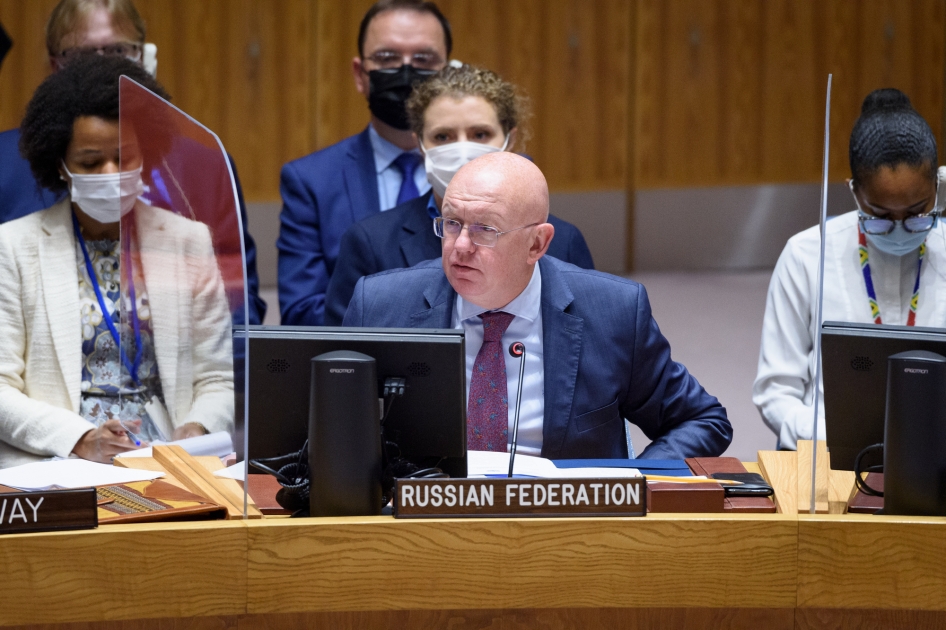Statement by Permanent Representative Vassily Nebenzia at UN Security Council open debate "United Nations peacekeeping operations: Technology and peacekeeping"
Mr.President,
Minister Jaishankar, we welcome your personal participation in this meeting. We highly appreciate the contribution of your country to the UN peacekeeping efforts. India is one of the biggest troop contributors to the peacekeeping operations, and it also actively engages in relevant discussions at the UN platform, aimed at enhancing efficiency of peacekeepers and improving their working conditions. It is no surprise that these issues were central to India’s Presidency in the Security Council.
We thank you for raising such important problems as ensuring safety of the Blue Helmets and use of latest technologies in peacekeeping activity. We supported the initiative that proposed drafting the two corresponding documents. We appreciate the work that your delegation has been doing. As a result, we are having two carefully calibrated documents that account for the interests of all Council members. That is why Russia chose to co-author the resolution on accountability for crimes against peacekeepers.
Mr.President,
The Blue Helmets have to perform their noble duty in extremely precarious and complex conditions, daily risking their lives. Their contribution to the cause of peace is invaluable. Therefore, investigating crimes against peacekeepers and bringing the perpetrators to account are the tasks that require specific attention. We need mechanisms that would allow administering justice regarding all such episodes promptly and in an unprejudiced way. There is a particularly great need for collaboration between the host side, the troop contributing state, and the UN Secretariat. All three of them need to act collectively, faithfully, and with due transparency. We proceed from the assumption that the resolution adopted today eliminated some gaps existing in this area.
As regards the need to supply the peacekeepers with modern equipment, this is beyond any doubt. We live in a rapidly changing world of technology. By all means, use of latest technologies in peacekeeping is an important issue, numerous aspects of which the UN member states are only about to discuss in order to elaborate shared approaches. As for the Secretariat, it should keep close track of these discussions and incorporate their results in its work. At this stage, member states share the understanding that use of technologies by the Blue Helmets and other UN personnel must be aimed at ensuring safety and security of civilians and the peacekeepers themselves.
State-of-the-art technologies will define our future, but opportunities also bring risks. Adoption of latest information and digital technologies and their use by peacekeepers must not be a threat to host states and their neighbors or invade people’s privacy. This issue becomes all the more sensitive when talking about the United Nations – an organization with unique reputation of justness and impartiality, the main task of which is to render selfless assistance to those who need it the most.
Mr.President,
We thank Secretary-General Guterres for his insights.
As the UN system adapts to emerging challenges and diversifies its tools and mechanisms of crisis prevention and resolution, the UN peacekeeping activity definitely remains among the most effective instruments to settle conflicts and help countries with the state-building process at a very early post-crisis stage.
At the same time, it is not uncommon that peacekeeping presences may be deployed for decades; however that may not guarantee tangible progress in the settlement and eradication of conflict’s root causes. This makes one think of effectiveness of peacekeepers’ mandates and feasibility of “inflating” those mandates to the detriment of national responsibility of the host state for its domestic political processes. Quality interaction with host state authorities also plays an important role here.
In this context, we are convinced that effectiveness of peacekeeping efforts does not always depend on technical equipment or gender representation or the number of deployed advisers on issues that are not core to the peacekeeping activity. We should not forget that the most important thing is overcoming political contradictions. It is the “alpha and omega” of the effectiveness of the United Nations and its peacekeeping operations.
History of conflicts in various regions of the world makes it clear that painstaking and laborious political and mediator efforts, when taken under full respect for sovereignty of states, can eradicate the root causes of conflicts rather than merely reverse their symptoms. Support for political settlement must be a priority of peacekeeping. Otherwise crises risk coming back after a short remission.
Thank you.
